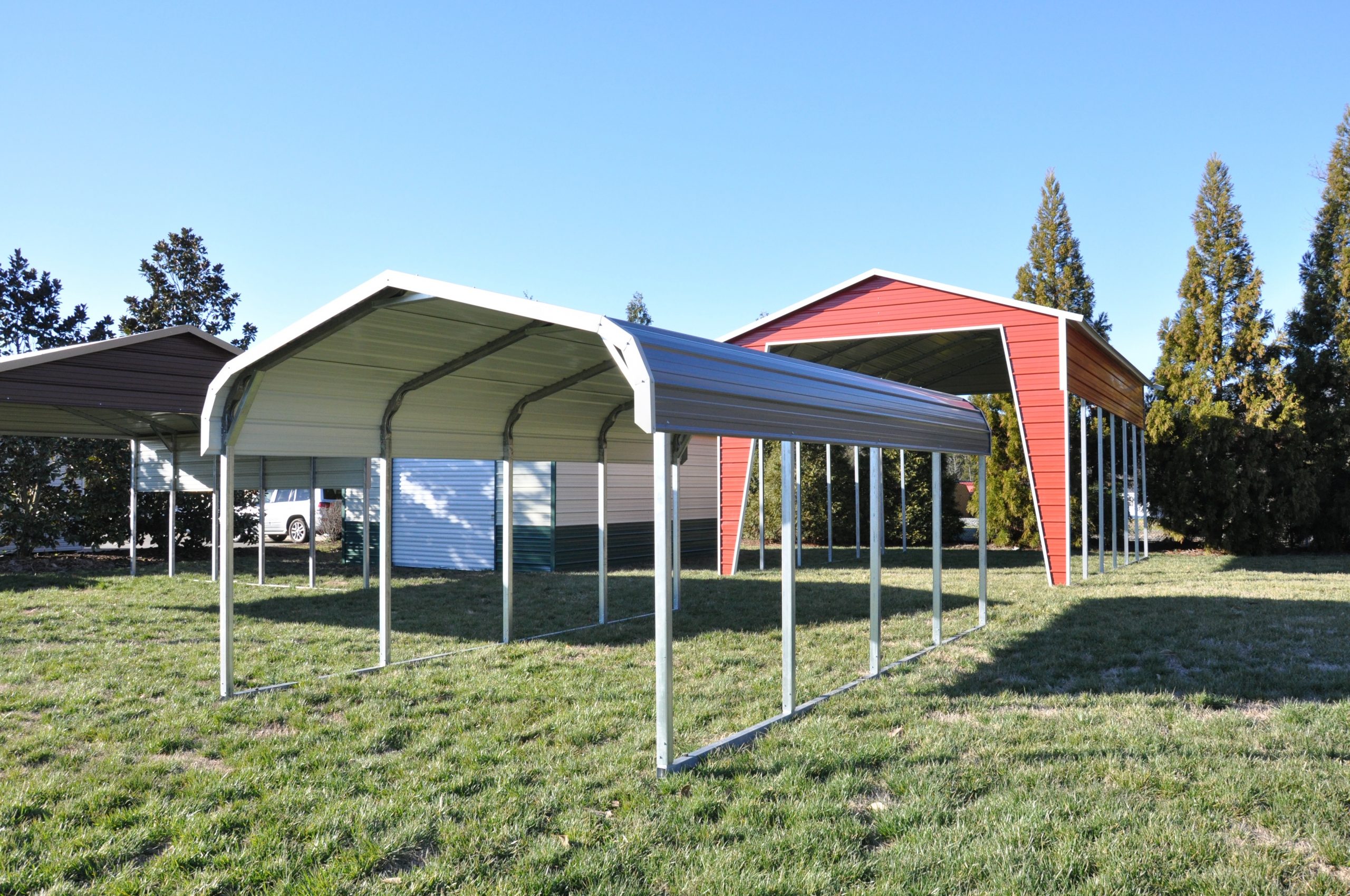In today’s world, sustainability is at the forefront of many decisions we make, whether in our personal lives or within the broader context of society. One area where homeowners can make a significant difference is in how they protect their vehicles. Carports, often overlooked as just a simple shelter for cars, are emerging as a viable and environmentally friendly solution.
The installation of a carport, when approached with sustainability in mind, can contribute to reducing environmental damage, offer eco-friendly benefits, and help homeowners minimize their carbon footprint.
How Does Carport Installation Contribute To Reducing Environmental Damage?
Carport installation plays a significant role in reducing environmental damage, primarily through the way it minimizes the use of materials that are damaging to the environment. Unlike traditional garages, which may require extensive excavation and the use of concrete, carports generally have a lighter ecological footprint.
Here are a few ways that carport installations reduce environmental impact:
- Less Concrete Usage: Concrete production is a major contributor to carbon emissions, with the cement industry alone responsible for approximately 8% of global CO2 emissions. Carports, on the other hand, require far less concrete since the structure is typically built with lighter foundations or even directly attached to a wall. In fact, many modern carport designs reduce or completely eliminate the need for concrete by utilizing steel or aluminum framing and sustainable decking materials.
- Preservation of Green Space: Carports allow homeowners to maintain more green space in their yards. With their smaller footprint compared to full garages, carports often leave the surrounding environment more intact. This helps preserve natural drainage, reduces soil erosion, and can even assist in supporting local ecosystems.
- Reduction in Heat Island Effect: Large parking lots and garages made of concrete or asphalt absorb heat, contributing to the urban heat island effect, where cities become hotter than their rural surroundings. Carports, when designed with proper shading and ventilation, can help mitigate this effect by keeping parking areas cooler. Not only does this make them more comfortable, but it can also reduce the need for additional air conditioning, saving energy.
What Are The Eco-Friendly Materials Used In Sustainable Carport Construction?
Sustainable construction materials are central to minimizing the environmental impact of a carport. When building a carport with eco-conscious materials, homeowners can further decrease their carbon footprint while still ensuring the structure is functional and long-lasting.
- Recycled Steel or Aluminum: Steel and aluminum are among the most recyclable materials available. By using recycled metals, carports can be constructed with minimal new material, thus reducing the need for mining and manufacturing. These metals also tend to be durable and resistant to weather, making them ideal for long-term use.
- Wood from Sustainable Sources: Wood is another excellent material for building carports, provided it comes from certified sustainable sources such as FSC (Forest Stewardship Council)-certified timber. Sustainable wood is harvested in a manner that ensures minimal ecological damage to forests. When treated and maintained properly, wooden carports are durable and can provide a natural aesthetic that blends well with the environment.
- Solar Panels: More and more homeowners are opting to integrate solar panels into their carports. Solar panels provide a renewable energy source, allowing homeowners to power their homes and even their electric vehicles using clean energy. Installing solar panels on a carport can transform the structure into an energy-producing feature, offsetting the carbon emissions associated with traditional energy sources.
- Permeable Paving: In many carport installations, especially when creating a driveway or flooring, the use of permeable paving materials is becoming increasingly popular. These materials allow rainwater to pass through them and return to the earth, helping to reduce surface runoff and prevent water from pooling, which can lead to soil erosion or waterlogging. Permeable paving materials include gravel, porous concrete, and permeable tiles.
How Can Carports Help In Minimizing The Carbon Footprint Of Homeowners?
The carbon footprint is an essential consideration in any home improvement project, and carport installation is no different. Carports offer multiple ways for homeowners to reduce their environmental impact, starting with their energy efficiency benefits.
- Reduced Need for Energy-Hungry Garages: Traditional garages, particularly those with insulated walls, air conditioning, and lighting, often require significant amounts of energy to remain functional and comfortable. Carports, by contrast, do not need heating or cooling, making them far more energy-efficient. This means that installing a carport rather than a traditional garage can immediately reduce a household’s energy consumption and associated carbon emissions.
- Solar Energy Harvesting: As mentioned earlier, integrating solar panels into the design of a carport can significantly reduce a homeowner’s carbon footprint. With the growing demand for electric vehicles (EVs), a solar-powered carport can charge EVs with renewable energy, eliminating the need for conventional power sources and further reducing carbon emissions. In addition, the energy generated by solar panels can power the home, reducing reliance on grid energy, which is often produced from fossil fuels.
- Encouraging Alternative Transport: A carport can also be a part of a larger eco-friendly lifestyle. By creating space for electric vehicles, bicycles, and other alternative transport, carports encourage homeowners to use greener transportation methods. For example, a carport may be designed to accommodate an electric vehicle charging station, which incentivizes the use of EVs. The infrastructure that supports alternative transportation methods is key to reducing overall greenhouse gas emissions.
- Water Conservation: As carports often incorporate rainwater collection systems, they provide an opportunity for homeowners to capture runoff water from their roofs. This collected rainwater can be repurposed for irrigation, thus reducing the need for municipal water and conserving a precious resource.
What Are The Long-Term Environmental Benefits Of Choosing A Sustainable Carport Design?
Opting for a sustainable carport is a long-term investment in environmental protection. While the initial installation may require some upfront costs, the long-term benefits far outweigh these expenses.
- Increased Durability and Longevity: Sustainable materials such as recycled steel, aluminum, and treated wood can withstand harsh weather conditions for years, requiring less frequent repairs and replacements. This reduces the demand for new materials over time, helping to conserve resources and minimize waste. A well-built carport can last decades, making it a highly sustainable option in the long run.
- Reduced Maintenance Needs: Sustainable carports typically require less maintenance than traditional structures. For example, metal carports are highly resistant to corrosion, and wood carports treated with eco-friendly preservatives need minimal upkeep. This reduces the need for harmful chemicals or excessive use of water and other resources in maintenance routines, further minimizing environmental impact.
- Enhancing Property Value and Appeal: Sustainable design often increases the overall value of a property, making it more appealing to environmentally-conscious buyers. As the demand for eco-friendly homes continues to rise, the inclusion of sustainable features such as a carport can make a home more marketable. This not only benefits homeowners financially but also promotes the spread of green initiatives in the housing market.
- Positive Impact on Local Ecosystems: As more homeowners opt for sustainable carports, the collective effect is a reduction in the strain placed on local ecosystems. By preserving green spaces, promoting renewable energy use, and reducing pollution, sustainable carports contribute to a healthier environment for both people and wildlife.
Carports, when constructed with sustainability in mind, offer a multitude of environmental benefits. From reducing the need for energy-hungry garages to using eco-friendly materials, these structures can significantly contribute to reducing a homeowner’s carbon footprint. Beyond the immediate advantages, carports also provide long-term ecological benefits, including durability, water conservation, and reduced maintenance. As the demand for sustainable living solutions continues to grow, carports stand out as an accessible, practical, and environmentally friendly option.
Why Choose Better Built Structures for Your Sustainable Carport Installation
At Better Built Structures, we understand the importance of a well-constructed, eco-friendly carport. Our commitment to sustainability and quality craftsmanship means that every project we take on is designed with the environment in mind. By choosing our services, you’re not only enhancing the protection of your vehicles but also contributing to a greener, more sustainable future.
Our team of experts works closely with you to ensure that your carport is tailored to meet your specific needs while incorporating eco-friendly materials and energy-efficient design principles. Whether you’re interested in using recycled steel, sustainable wood, or even adding solar panels to your carport, we have the expertise to bring your vision to life.
Transparent Pricing for Sustainable Carport Solutions
At Better Built Structures, we believe in providing clear and transparent pricing for all of our sustainable carport installations. We understand that every project is unique, which is why we offer customized quotes based on the materials, size, and design features that you choose. Our goal is to deliver high-quality, eco-friendly carports that fit within your budget while ensuring long-term value.
Our pricing is competitive, and we strive to keep costs affordable by using efficient construction methods and sustainable materials that provide both durability and minimal environmental impact. While the cost of a sustainable carport may vary, our clients find that the long-term savings on energy bills and reduced maintenance needs make the initial investment worthwhile.
Contact Better Built Structures today to get your personalized quote and start building a carport that benefits both you and the planet. Together, we can create a lasting solution that adds value to your property and contributes to a greener future!






